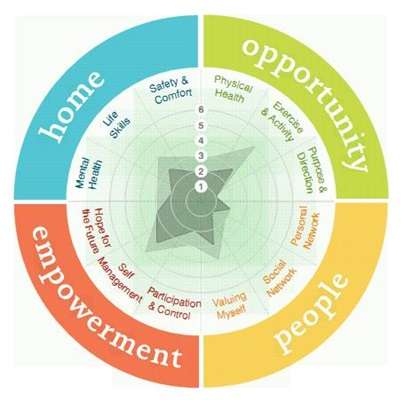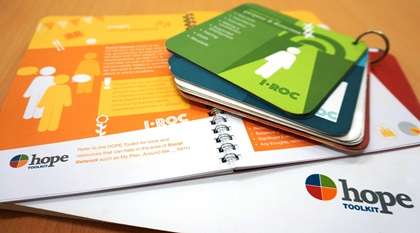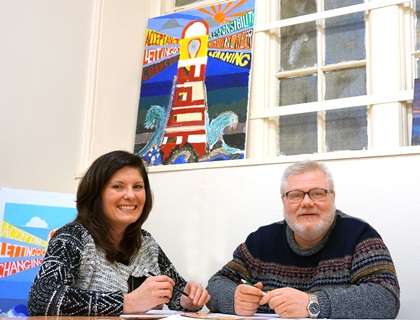The I.ROC chart
An innovative new way of assessing a person's recovery from mental health problems has been developed by the mental health charity Penumbra and Abertay University.
Unlike most assessments which contain long lists of questions, I.ROC – the Individual Recovery Outcomes Counter – is a colourful little booklet full of cheerful graphics.
Its innovation lies in the fact that it measures recovery, rather than symptoms and level of illness – the focus of most existing questionnaires.
Recovery is the ability to live a meaningful and fulfilling life in spite of mental illness, and I.ROC measures this by asking just 12 questions which focus on areas of people's lives that are known to have an impact on mental health and wellbeing.
These include how much control a person has over decisions that affect them, how much they value and respect themselves, and how much hope they have for the future.
Every three months, each of these 12 indicators of wellbeing is rated by the user on a scale of one (never) to six (always), and plotted onto the I.ROC chart.
When the plotted dots are joined together, it gives that person an instant, visual appraisal of their wellbeing and shows them where they can make small, practical changes in their lives that will, over time, add up to sustained and measurable improvements.
Mandy McLernon, Support Manager at Penumbra's Angus Nova Project in Arbroath, explains how it works in practice:
"Although it can just look like a piece of paper with some lines on it at first, the beauty of I.ROC is that the first one you do is just your baseline so, when you come to fill in your second and third one, you can see – right there in front of your eyes - that you have slowly but surely been making improvements.
"If you've scored just a one for something like your social network and how much you take part in community activities, then you can sit down with your support worker and think of ways that you could improve that score.
"The aim isn't to make a giant leap from a one to a six overnight, but by getting someone to think to themselves 'how could I get from a one to a two?' they begin to make small, positive changes in their lives that not only improve their mental health because they're doing them, but also improve their feelings of self-worth and pride in who they are as a person in and of themselves.
"These feelings of achievement and accomplishment can do wonders for a person's self-esteem - something that is often lacking in people going through mental health difficulties. People with mental health issues often find it hard to monitor their feelings, but because I.ROC is so visual, it really helps people keep on top of things."
I.ROC materials
I.ROC has been created from the bottom up, in close collaboration with those experiencing mental health difficulties and those who support them – the first time the experiences of the people who actually use such tools has been taken into consideration in their development.
This new approach means that the people who use Penumbra's services are turning from passive recipients of care into experts in their own wellbeing and recovery – a radical and revolutionary shift away from the traditional medical model.
Robin Ion – Head of the Division of Mental Health Nursing at Abertay University, who was involved in validating I.ROC – explains:
"In the past, and in many existing mental health services, there was a focus on cure and not recovery.
"The biological model focusses almost exclusively on treating mental health problems with medication, and there is very little attention given to helping the person to develop strategies for coping with what they are experiencing and to live a good life with or without these experiences.
"But living a meaningful and fulfilling life in spite of mental distress is what recovery is all about – and this is what I.ROC helps people to achieve.
"By looking at the individual in the round, it builds up a picture of everything that impacts on their mental health, both good and bad. It recognises the positives, but also helps identify the areas they need to work on or get help with so that they can improve their own wellbeing. With I.ROC's help, people learn to cope, and also begin to live fulfilling lives again."
Mandy McLernon and Robin Ross
Case Study
Robin Ross
Robin first came to Penumbra two years ago, after finally being diagnosed with bipolar disorder after many years of mental health problems.
Having used many mental health assessments in the past which made little difference to his life, the changes that I.ROC has brought about have been exponential, as he explains:
"When I first came to Penumbra, I was in a very bad way. I had suffered from depression for many years, but had only relatively recently been diagnosed with bipolar disorder. And it was hard coming to terms with that diagnosis because there's a lot of stigma attached to mental health, and I felt ashamed and guilty because I had a mental health problem.
"I'm a trained psychiatric nurse, and when I started out, there was no concept of 'recovery' – that you could live a meaningful and fulfilling life at the same time as having a mental illness. It was just accepted that you would always be ill and that you would get progressively worse as time went by. So I really had no hope until I came to Penumbra and was introduced to the idea that it would actually be possible to improve my situation.
"And I.ROC has been central to my recovery. When I look at my first I.ROC I did two years ago, and compare it to my most recent one, I can hardly believe how far I've come. My life was so small back then – you can see that in my chart. I had very low scores for things like my personal and social networks – I had very few friends, I didn't feel in control of my life, I wasn't doing anything that made me feel happy, and I was really isolating myself because I had such low self-esteem.
"But that's why I.ROC is so effective – it shows you at a glance where you need to address things. You take it home and look at it and think, 'wow, there are actually things I could do to get myself higher scores in these areas I'm doing badly in.' And that's a really empowering feeling. So, rather than simply taking the pills the doctor prescribes you and believing that that's all you can do for yourself, your support worker helps you to think of things you could do yourself to improve your own wellbeing. For me, it was starting up some hobbies – I went to Tai Chi at first, then creative writing lessons and eventually took up guitar lessons as well. I filled my life with things I enjoyed, little by little, and it has completely turned my life around!
"It wasn't easy though, and it didn't happen overnight. But that's the point of I.ROC – it builds you week after week, month after month, into a more rounded person. It lets you know where you are today and that you can improve on that. You can look at your chart and think 'well, today I want to score a two instead of a one, so what can I do to improve it a little?'
"It's hard work, but you have to remember that to get through a mental health issue takes real strength. You need to count yourself lucky that you know you've got a mental health issue, because then you can work on your recovery.
"It's amazing to look back at that first I.ROC I did and to see just how much power I had lost in my life. But equally amazing to see how different my life is now. That's one of the main things that I.ROC has helped me to work on – how to feel empowered and like I am actually living my life, rather than my disorder. I had really just given myself over to the care of others before I came to Penumbra, and didn't realise that I had a role to play in my own care. Seeing the progress I've made on my journey of recovery through I.ROC is incredible. I am engaged in my own care now, and it is truly empowering to know that."
Provided by University of Abertay Dundee






















